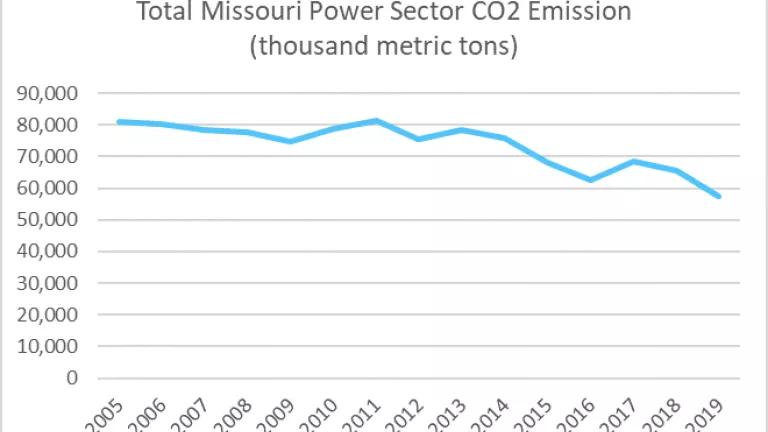As Missouri’s legislative session was coming to an end on Friday, supporters of the Renewable Energy Standard (RES) waited with bated breath to see if any last minute amendments would sneak through and potentially repeal or weaken the Standard. As the session was called to and end and Senators enthusiastically flung papers into the air, RES supporters sighed with relief. There was no funny business, no sneaky amendments. The Renewable Energy Standard remained intact. We prevailed.
As I discussed in a previous post, Missouri’s Renewable Energy Standard requires that investor-owned utilities incrementally increase renewable electricity generation over time so that by 2021, Missouri’s energy mix will contain 15 percent renewable energy from sources like solar energy, wind, biomass, and small-scale hydropower facilities. To protect ratepayers, utilities are prevented from increasing power prices more than 1 percent. Missourians voted overwhelmingly back in 2008 to create this Standard by passing Proposition C. This proposition passed by a whopping 2-1 margin, with every county but one voting in favor of the Standard.
Yet, despite this broad and clear support for the Standard, earlier this year Representative Bart Korman sponsored a bill (House Bill 44) that would have effectively done away with the Renewable Energy Standard by allowing power from any hydropower facility to count towards the Renewable Energy Standard. This would have meant that there would have been no incentive for companies to grow the renewable energy industry within Missouri because the Standard’s targets would have been satisfied by existing out-of-state (and, with the way the bill was written, even foreign) hydropower. Passing such a bill would have meant saying goodbye to the potential job creation that study after study has shown new clean energy projects provide. In fact, a 2008 University of Missouri-St. Louis study predicted that the Renewable Energy Standard would create 9,591 jobs and generate $2.86 billion in economic activity in the state over the next 20 years.
House Bill 44 passed the House in March and had a hearing in the Senate committee in mid-April. In the weeks leading up to the hearing, several citizens expressed their support of the Renewable Energy Standard in local newspapers. One citizen shared how using the solar rebate program in the Standard allowed her school to build solar panels on its roof, saving the school over $33,000 in energy costs over ten years. Members of the renewable energy industry outlined how the Standard has encouraged the growth of the solar industry in Missouri. And the Kansas City Star published a strong editorial stating that the Senate should not support House Bill 44. During the hearing, eleven parties testified against the bill in person, and NRDC provided written testimony opposing the bill as well. The committee did not vote on whether or not to pass the bill out of committee during the hearing. And in the weeks following the hearing, more citizens declared their support of the Renewable Energy Standard, including people of faith explaining how developing renewable energy aligns with teachings on stewardship and people outlining how the Standard can help address Missouri’s over-reliance on coal, which leads to poor air quality and high asthma rates. It seems these voices were heard.
The Senate committee never voted on House Bill 44, and therefore House Bill 44 never made it to the Senate floor. But as the weeks went by and the end of session drew near, supporters of the Renewable Energy Standard became concerned that there may be some sneaky effort to attach an amendment to another bill that would similarly neutralize the Standard. However, no such attack came. All of our work for the last five months had paid off; the Renewable Energy Standard was safe. RenewMO, NRDC’s ally, deserves significant recognition for their work rallying supporters and coordinating allies to show legislators that the Standard is still well-supported by Missourians.
As mentioned before, the attack on Missouri’s Renewable Energy Standard was part of a coordinated effort to repeal or weaken such standards across the nation. We have already seen such efforts fail in Kansas. And such efforts are also failing in North Carolina. Some fights are still underway, but it is clear that citizens support renewable energy standards, the standards are providing boosts to the states' economies, and legislators are paying attention.



